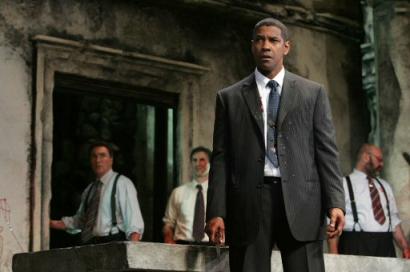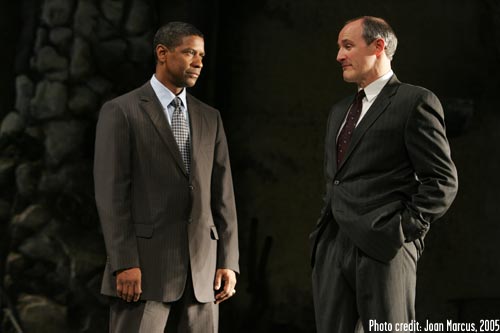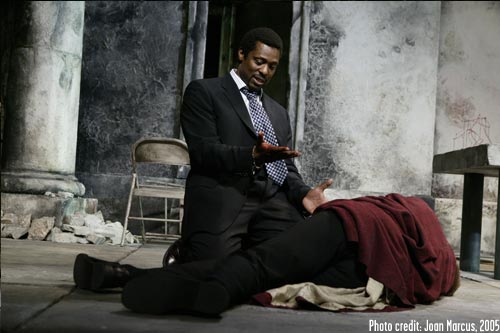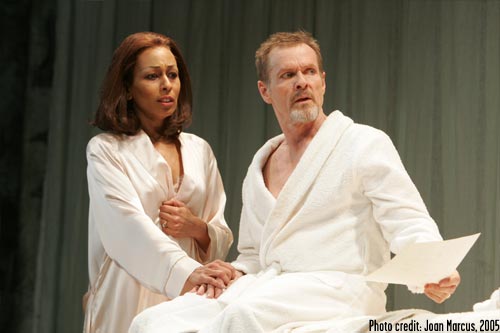Following up The Pianist and Oliver Twist, veteran director Roman Polanski will next head to Pompeii, with a $130 million budget (his largest ever). “Based on the bestseller of the same name by ‘Fatherland’ novelist Robert Harris, the story follows a young engineer who has to repair an enormous aqueduct whose destruction threatens the Roman Empire.“
Category: The Ancient World
Spartans via Kiwi.
Two more minutes before my Internet time runs out and I disappear back into the ether…so, before I go, here’s the full trailer for Zack Snyder’s 300. Not as effective as — and somewhat derivative of — the grand teaser (and still no sign of McNulty or Faramir), but I’ll probably still catch it, if nothing else than to see what’s in store for The Watchmen.
Forth the 300.
Ok, it’s still basically just a lot of flexing and screaming. Nevertheless, the new trailer for Zach Snyder’s 300 is out, and it’s an adrenaline shot…one of the more effective previews I’ve seen in awhile. (And “Tonight we dine in Hell!” seems like it might be an apt catchphrase for all kinds of situations.)
Diamond Dogs | The Dogs of War.
In other recent trailers, much slow motion screaming: Leonardo di Caprio, Jennifer Connelly, and Djimon Hounsou venture through deepest, darkest Africa (and get shot at a lot) in their search for Edward Zwick’s Blood Diamond. And, Gerard Butler puts on his Spartan game face (with aid of a David Wenham voiceover) in this music video-ish glimpse at Zack Snyder’s 300, based on the Frank Miller graphic novel about the Battle of Thermopylae.
Men of Gondor (and Baltimore).
King Leonidas (Gerard Butler) enlists backup from Faramir and Jimmy McNulty as David Wenham and Dominic West join the cast of 300 — based on Frank Miller’s graphic novel retelling of the Battle of Thermopylae — along with Rodrigo Santoro of Love, Actually and Lena Headey of The Brothers Grimm. 300 Spartans against a million Persians? McNulty had best call up Omar for this one.
Washington in Rome.
“Why should his name be sounded more than yours? Write them, yours is as fair; Sound them, Yours doth become the tongue as well.” Why? Well, cause he’s a full-fledged movie star, that’s why. Still, despite having a bit of a muttering problem at times, Denzel acquits himself “honorably” as Brutus in Julius Caesar, which I saw last night at the Belasco Theatre. Set in a half-post-apocalyptic, half-Depression-era Rome that evokes anything from Masked & Anonymous to Black Hawk Down, this version of Shakespeare’s classic is innovatively staged and well-worth seeing, but, unfortunately, it also suffers from a stylistic dissonance that hinders the play at its most crucial moments.
The central problem with this production is the clash of acting methods. Many of the actors — and particularly Denzel — underplay their roles to the extreme. In fact, in delivery if not in diction, Denzel’s naturalistic Brutus is only a step or two from most of his other performances, be it Glory, Devil in a Blue Dress, or The Manchurian Candidate. That would be fine, if everyone else was on the same page, and a lot of the other actors are. Jack Willis (at left) deadpans Casca like Cypher from The Matrix, and Patrick Page steals his one major scene (in which he convinces Caesar to report to the Senate on the Ides of March) by portraying Decius Brutus as the worst kind of unctuous DC aide, complete with a leather executive folder in tow and a flatterer’s simper plastered on his face.
Unfortunately, some of the other actors didn’t get the memo. Bill Sadler’s Caesar is prone to acts of grandstanding, but that’s acceptable — he’s Caesar, after all, and bestrides the narrow world like a Colossus. No, the main offender is Colm Feore as Cassius, who plays the lean, hungry Machiavel in full “Master Thespian” mode — at times he’s hammier here than he was in Riddick. I’ll admit, I may be being a bit hard on Feore, as Cassius has always been one of my favorite Shakespearean characters (well, until he gets all weepy and high-maintenance in the second half of the play.) And Feore’s performance might be fine for a different cast of Caesar…but here, he’s just off. If this is Denzel’s Julius Caesar, as everything seems to suggest, Feore’s portrayal of Cassius should have mirrored Denzel’s low-key, understated Brutus. Instead, Feore is overplaying to the hilt, and the contrast is jarring in every scene the two central plotters share.
The Denzel-disconnect causes problems elsewhere, too, notably in the crucial Act III funeral speeches. Eamonn Walker makes a fine Mark Antony throughout, but he just doesn’t have the star wattage or natural charisma of Denzel Washington. As a result, Antony’s manipulative eulogy — the critical hinge moment of the play — seems slightly tepid and uninvolving compared to Brutus’ earlier rousing oratory. It’s possible that I’m just ruined by the James Mason-Marlon Brando version, as there does seem to be some precedent in the play for this take: “I am no orator, as Brutus is…I have neither wit, nor words, nor worth, action, nor utterance, nor the power of speech, to stir men’s blood.” Still, I think there’s a dramatic problem if Brutus’ oration is more of a showstopper than Antony’s. If anything, it seems here that their roles should have been reversed.
Still, despite these grievances, Julius Caesar is a satisfying production for the most part, with some particularly nice visual flourishes throughout. The Escape from New York, Berlin-bunker look of the set seems strange at first, but gains potency as the play darkens — in the “Cinna the poet” mob scene, for example. (Speaking of which, between this and Sith, it’s been a bad week for republics.) And I particularly liked the look of the Senate, even if it was somewhat reminiscent of Liev Schrieber’s EXCOMM war room in the Henry V revival two years ago. (With that in mind, the play gets off a great Homeland Security gag, as the various conspirators have to figure out a way around the Senate metal detector.)
The war scenes of the final acts are also surprisingly kinetic, with Roman forces garbed in guerilla green or black weaving through the hollowed-out set and spouting commands in verse. In fact, while I guess this shouldn’t be a shock given the subject matter, this production of Julius Caesar is also quite grisly — they don’t skimp on the blood and gore, and Sadler’s corpse is frozen in a horrifying Ring-like rictus scream during the Antony speech. (Strangely, this produced nary a shudder in the crowd, while the mere sight of Caesar’s bare posterior earlier on sent the audience into a paroxysm of shocked gasps — the MPAA has screwed up this country something fierce.)
So, in sum, Julius Caesar is a worthy production that makes for a good evening out, but it’s got some issues that keep it from being an all-time classic version of the play. The fault, dear readers, is not in its stars, but in its supporting cast, that they are underlings. In the end, a more balanced production, with either more or less star power, would have probably worked out better.
Arrr.
Sorry, Ted – You may be The Late Adopter, but now we have an even later adopter in the Columbia History Department — On Friday, ancient historian Jason Governale set sail with his new blog Corsairs United. Happy hunting.
Babylon by Bus (and Chopper).
“Not only is what the American forces are doing damaging the archaeology of Iraq, it’s actually damaging the cultural heritage of the whole world.” Archaeologists of the British museum fault US forces for damaging what’s left of ancient Babylon, currently a base for US and coalition marines. While our troops did originally work to prevent the looting of artifacts, later attempts to construct parking lots and a helipad at the site apparently caused all kinds of needless wear and tear.
Team Alexander: World Police.
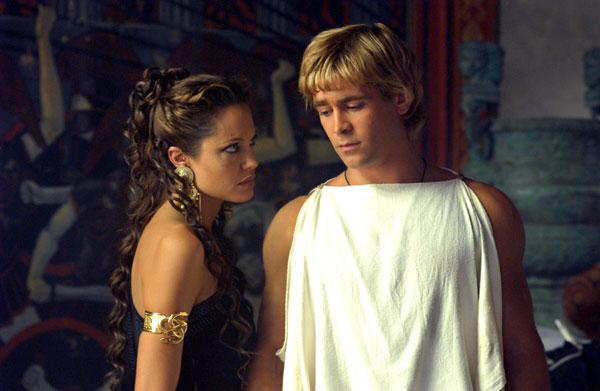
Alexander the Great. Seeker, despot, conqueror, legend…and who knew he anything to do with the Kennedy assassination? Ok, Oliver Stone’s Alexander doesn’t actually pin the events of November 22, 1963 on the Macedonian conqueror, but, to be honest, I kinda wish it had — it might have injected some much-needed energy into the film. Over the past two decades, Oliver Stone has made films that are stunning, controversial, wrongheaded, and unforgettable, but never before has he made one so flat-out dull.
To its credit, I guess, Alexander shows signs of being an absolute train wreck right from the first reel. After a very brief nod to Citizen Kane, which suggested we may at least be getting a gloriously over-the-top outing from Stone this time around, the film settles in to Anthony Hopkins wandering around the set of the “Losing My Religion” video and spitting out long, interminable chunks of Basil Exposition. (Speaking of which, Stone must have been watching his VH1-Classic…there’s a scene on a mountaintop later that seems lifted straight out of Depeche Mode’s “Enjoy the Silence.”) Then, we’ve got Mommy Dearest Angelina Jolie writhing around with snakes for a bit (women = serpents = temptresses = deceivers, get it? Don’t worry, in typical Stone fashion, the point will be beaten into the ground over the next three hours.) Twenty minutes in, by the time young Alexander is channeling the Horse Whisperer, it’s pretty clear we’ve got a real stinker on our hands.
From there on, it’s just a pile-up. Other than a neat camel charge or two, the battle setpieces are completely inscrutable, and not in a good “Fog of War” kinda way. For some reason, the men all speak with Irish brogues, while both women (Jolie and Rosario Dawson) sound like Brides of Dracula. Give them credit, though. Jolie, Dawson, and Val Kilmer (as Phillip of Macedon, by way of Dr. Moreau) seem to be the only three people involved with this project who saw it for what it was and racheted up the hamminess dial to 11.
Much has been made in some reviews of Stone’s decision not to shy away from Alexander’s bisexuality — namely his love affair with the doe-eyed Hephaistion (Jared Leto, who fulfilled close to the same function for Tyler Durden in Fight Club) — and I suppose he should be applauded for it, given the recent trends in Red State country. But, frankly, what with all the earnest looks and pre-established Freudian baggage, it all comes off as high camp, and not nearly as open-minded as it thinks it is. Not that heterosexual relations fare much better, mind you…when Colin Farrell and poor, lovely Rosario Dawson hiss, scratch, and wrestle naked on their wedding night (yes, you guessed it, snake flashbacks are involved), it’s just about the most ridiculous thing you’ve ever seen.
To sum up, Alexander is a flat-out disappointment and easily the worst Oliver Stone film I can think of offhand. This review notwithstanding, it’s not even fun-bad. Think of it more as Alexander And The Terrible, Horrible, No Good, Very Bad Movie.

Philanderers of the Pleistocene.
“‘It is a pattern that has built up over time,’ said Dr Jason Wilder, from the University of Arizona in Tucson, USA. ‘The norm through human evolution is for more women to have…children than men. There are men around who aren’t able to have children, because they are being out-competed by more successful males.’” One of my high school roommates — now a biologist at Arizona — unearths genetic evidence that prehistoric Lotharios really got around, while Beta Cavemales have always had it bad. I dunno, I always thought Barney Rubble did pretty well for himself…

